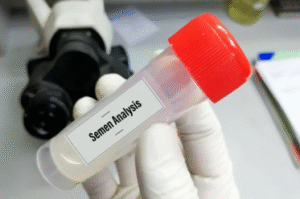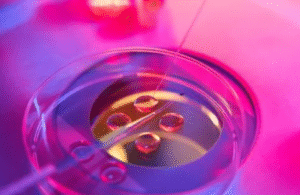For many couples, parenthood is a cherished dream. However, infertility challenges, such as azoospermia—a condition where a man’s semen contains no measurable sperm—can make this journey difficult. Thankfully, advancements in medical technology now enable men with no sperm to father biological children. Let’s explore the causes, diagnosis, and cutting-edge treatments for azoospermia.
What is Azoospermia?
Azoospermia, a condition affecting approximately 1% of men globally, is a leading cause of male infertility. It is classified into two types:
Obstructive Azoospermia (OA): This occurs when sperm production is normal, but a blockage prevents sperm from mixing with semen. Common causes include:
- Vasectomy or surgical complications.
- Congenital absence of the vas deferens (often linked to cystic fibrosis).
- Infections or inflammation in the reproductive organs.
Non-Obstructive Azoospermia (NOA): This type occurs when the testicles produce little or no sperm due to:
- Genetic conditions like Klinefelter syndrome or Y-chromosome microdeletions.
- Hormonal imbalances, such as low testosterone.
- Lifestyle factors include obesity, smoking, and heat exposure.
Can a Man with No Sperm Father a Child?
Early diagnosis is vital. If a couple has been trying to conceive for over a year without success, the male partner should undergo:


Semen Analysis: The first step is to confirm the absence of sperm.
Hormonal Testing: Blood tests for FSH, LH, testosterone, and prolactin levels.
Genetic Testing: Screening for conditions like Klinefelter syndrome or CFTR gene mutations.
Scrotal Ultrasound or Doppler: Imaging tests to identify abnormalities such as varicocele or undescended testicles.
Testicular Biopsy: Helps to differentiate obstructive and non-obstructive azoospermia.
Cutting-Edge Treatment Options
Advancements in reproductive medicine offer multiple solutions:
For Obstructive Azoospermia
Surgical Procedures:
- Vasovasostomy (vasectomy reversal).
- Vasoepididymostomy to bypass blockages.
Sperm Retrieval Techniques:
- Percutaneous Epididymal Sperm Aspiration (PESA).
- Microsurgical Epididymal Sperm Aspiration (MESA).
For Non-Obstructive Azoospermia
Hormonal Therapy: Medications like gonadotropins to stimulate sperm production.
Advanced Retrieval Methods


- Testicular Sperm Aspiration (TESA).
- Testicular Sperm Extraction (TESE).
- Micro-TESE is a high-precision technique to locate and extract sperm.
- Assisted Reproductive Technologies (ART)
Once sperm is retrieved, it can be used with:
Intracytoplasmic Sperm Injection (ICSI): A single sperm is injected directly into an egg, significantly increasing success rates.
In Vitro Fertilization (IVF): Fertilized eggs are implanted in the uterus. Combining IVF with ICSI ensures better outcomes.
Why Choose Chennai for Treatment?
Chennai has emerged as a premier destination for fertility treatments due to:
- State-of-the-art IVF facilities equipped with advanced technologies like Micro-TESE and MESA.
- Skilled fertility specialists and embryologists.
- Affordable treatment options compared to international centres.
- Personalized care tailored to individual needs.
Technological Advancements in Chennai
Modern fertility clinics in Chennai leverage innovations such as:
Time-Lapse Imaging: Continuous monitoring of embryos to select the healthiest ones.
Genetic Testing: Preimplantation Genetic Testing (PGT) identifies abnormalities, enhancing success rates.
Cryopreservation: Freezing and storing sperm, eggs, or embryos for future use.
AI-Assisted Embryo Selection: Artificial intelligence to predict embryo viability and improve outcomes.
Emotional Support and Counseling


Infertility can be emotionally taxing. Fertility clinics in Chennai emphasize:
- Counselling to help couples navigate stress.
- Support groups to share their experiences and build the community to reduce the cause of infertility.
- Lifestyle guidance to improve overall reproductive health.
Conclusion
A diagnosis of azoospermia no longer means the end of the road for aspiring parents. With cutting-edge treatments and world-class care available in Chennai, the dream of parenthood is closer than ever. Whether through surgical solutions, ART, or a combination of treatments, there is hope.
If you’re facing difficulties conceiving, take the first step by consulting a trusted fertility center in Chennai. Early diagnosis and personalized care can turn your dream of parenthood into a reality.
FAQ – Can a Man with No Sperm Father a Child?


1. What if a man has zero sperm count?
A zero sperm count (azoospermia) doesn’t always mean there’s no hope. Some men have a blockage or hormonal issue that can be treated. In other cases, sperm may still be retrieved directly from the testes using special techniques like TESE or Micro-TESE, allowing for fertility treatments like IVF with ICSI.
2. What drink can increase sperm?
Drinks rich in antioxidants and nutrients can help improve sperm health. Some good options include:
-
Pomegranate juice
-
Green tea
-
Beetroot juice
-
Amla (Indian gooseberry) juice
-
Smoothies with spinach, banana, and nuts
Avoid alcohol and sugary sodas as they may negatively impact sperm quality.
3. What are the signs of weak sperm?
Weak sperm refers to poor motility, low count, or abnormal shape. You might not notice symptoms directly, but possible signs include:
-
Difficulty conceiving despite regular unprotected intercourse
-
Low libido or erectile dysfunction (sometimes associated)
-
Abnormal semen analysis results
A semen analysis is the best way to check sperm health.
4. Which fruit is best for sperm?
Fruits that are high in antioxidants and vitamins can boost sperm health. Some top picks include:
-
Bananas – Rich in bromelain and B vitamins
-
Oranges – High in vitamin C
-
Berries (blueberries, strawberries) – Antioxidant-rich
-
Pomegranates – Boost testosterone and sperm quality
-
Avocados – Loaded with vitamin E and folate
5. What are signs of healthy sperm?
Signs of healthy sperm (usually seen in a lab test) include:
-
Good count – More than 15 million sperm per ml
-
Strong motility – At least 40% moving actively
-
Normal shape – At least 4% of sperm with normal morphology
-
Thick, white semen – Generally indicates good volume and consistency
A semen analysis gives the most accurate picture of sperm health.




